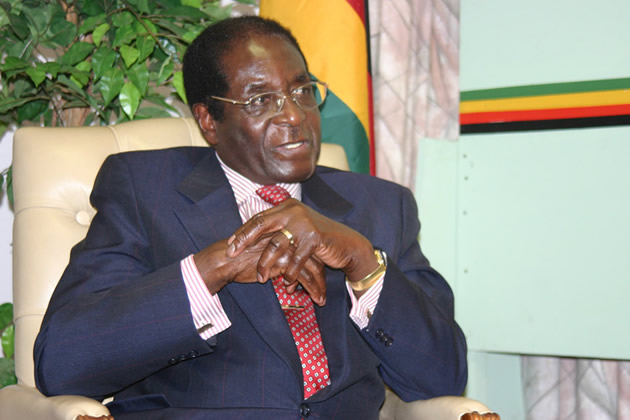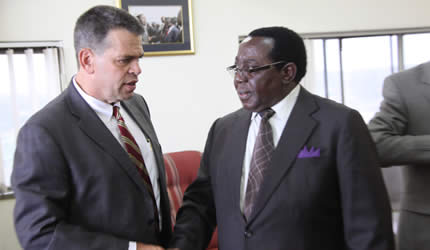The Other Side: Zim-Asset for empowerment

Nathaniel Manheru
Let me begin by heartily congratulating you all Zimbabweans as we celebrate this 34th Anniversary of our country’s sovereign Independence. Makorokoto! Amhlope! Congratulations!
Today, as we celebrate this happy and joyous birthday as a Nation, we should hold dear the sacrifices that our people had to endure in order to dislodge the cruel settler colonial regime that was bent on oppressing and suppressing our people in order to freely plunder our God-given natural resources.
I, therefore, wish to thank the people of Zimbabwe, for standing steadfast and resolute, not only in defence of our hard-won freedom, but also in supporting the pursuit of our country’s socio-economic development. The sacred values of patriotism, hard work, dedication to duty and the abiding spirit to serve one’s country and its people, are virtues that must continue to propel this great nation.
Today, fellow Zimbabweans, we also have cause to celebrate this special occasion as the first Independence anniversary after Zimbabwe successfully held the July 31st harmonised elections under our home-grown Constitution. Allow me, at this juncture, to take this opportunity to express my sincere gratitude and appreciation to you all, for the trust and confidence you continue to bestow on me personally, and in my party Zanu-PF.
I wish to urge all Zimbabweans to remain united as a people, always remembering that, as Zimbabweans, we have a common destiny, as sons and daughters of the soil.
We must, this year, thank Almighty God for blessing us with very good rains. Most parts of the country are promising good harvests and pasture for our livestock, thereby guaranteeing us food security, and reducing the burden of food imports.
Sadly, I have to observe that some parts of the country experienced floods during the 2013/ 2014 agricultural season. The floods were mainly experienced in Chivi and Tsholotsho districts.
As 6 393 households were affected, Government declared a state of national disaster to allow the emergency evacuation of people, livestock and other assets from the affected areas. In collaboration with the corporate sector and other development partners, Government was able to provide relief to the affected families. We, therefore, wish to acknowledge and thank all those who assisted.
In pursuit of our country’s development, Government has developed and begun to implement the Zimbabwe Agenda for Sustainable Socio-Economic Transformation, (Zim-Asset).
Zim-Asset seeks to provide simultaneously an enabling investment climate, a growing economy and an empowered society.
The agriculture sector, which in 2013 grew by 5,1 percent, is projected to grow by up to 9 percent in 2014. The positive growth is mainly attributed to the good rains received countrywide in the 2013/ 14 farming season and the timeous availing of inputs to our farming community.
Government disbursed US$72,5 million worth of agricultural inputs which benefited at least 1,6 million households.
Zimbabwe’s manufacturing sector continues to experience various challenges, chief among them is the liquidity crunch and the widening trade deficit.
The country is also experiencing a rapid de-industrialisation process, which is a clear sign of unhealthy financial situation. The country’s trade balance shows that we are importing more goods and services than we are exporting. This is one of our main liquidity challenges.
Government should actively work to promote the export of value-added commodities, but at the same time discourage the importation of goods that are readily available on the local markets. This should, hopefully, reduce the trade imbalance.
Being the country’s fastest growing sector, mining is Zimbabwe’s leading foreign exchange earner, accounting for over 50 percent of total exports, while it ensures the country’s accelerated economic growth and development.
Government is, however, reorganising the mining sector so as to make it more efficient and more transparent. To this end, much focus is also being placed on mining exploration, pursuing value addition and establishing refining processes of mainly gold, platinum, diamond, iron, chrome and nickel.
The 20th Session of the United Nations World Tourism Organisation, declared the best-attended in the history of the organisation, was co-hosted by Zimbabwe and Zambia in August 2013. It provided an invaluable opportunity for Zimbabwe to showcase its unique, rich and diverse natural heritage, and that Zimbabweans are a peace-loving, hospitable, enterprising and progressive people.
Zimbabwe, which has begun to implement key decisions that emanated from the General Assembly, has embarked on a pilot UNI-VISA project with Zambia. When complete, the process will be cascaded to other countries that are part of the Kavango Zambezi Transfrontier Conservation Area in a quest to optimise the seamless cross-border movement of tourists.
In its quest to restore solid and comprehensive infrastructure, a key enabler of various economic development, Government is prioritising electricity generation assets to full capacity. To this end, Government has committed financial resources towards the rehabilitation and maintenance of existing power infrastructure in order to achieve optimal performance.
This has seen the country’s power stations increasing output to averages of 600 Megawatts for Hwange Power Station, 750 megawatts for Kariba Power Station, and 100 megawatts for the small thermal power stations of Harare, Bulawayo and Munyati.
Rehabilitation of the grid is also in progress, with major equipment such as transformers and switch gears, being replaced or renewed. Distribution power lines and cables are also in the process of being replaced.
More thermal and solar power programmes are currently being discussed.
As a long term measure, having secured a sum of US$319,5 million loan facility from Chinese Eximbank, Government has embarked on the Kariba South Power Station Expansion Project, scheduled to be commissioned in 2017, the project will see an increase in the power generation by an additional 300 Megawatts.
Additional to the expansion of Hwange Power Station and the Batoka George, the electrification of rural areas is continuing, with an average of 400 rural institutions being electrified every year.
Government is also committed to the provision of biogas, mini-hydro and solar clean energy sources, which will go a long way in alleviating some of the power shortages currently experienced.
While successful projects, including JN Nkomo Airport, Victoria Falls Airport, the Buffalo Range Airport have either been completed, or are near completion, the condition of the National Railways of Zimbabwe’s (NRZ) infrastructure continues to pose serious challenges to the smooth movement of goods and passengers. More concerted efforts are, therefore, envisaged to comprehensively address the requirements of the rail sector.
In collaboration with its development partners, Government is working towards the improvement of water supply and the disposal of waste water in our cities and towns.
Under the Urgent Water Supply and Sanitation Project (ZimFund) first phase, a sum of US$43,6 million has been allocated. This facility should improve the water supply and sanitation situation in Harare, Chitungwiza, Mutare, Masvingo, Kwekwe and Chegutu.
The second phase, launched in March 2014, will rope in Ruwa and Redcliff to Harare and Chitungwiza. In addition, 14 small towns’ water supplies and waste water treatment plants are also being rehabilitated.
Some 10 000 existing boreholes are being rehabilitated, 1 500 new boreholes drilled, 1 000 toilets and 30 piped water schemes constructed.
Government continues promoting tree planting, that has seen some 9,8 million trees being planted during the current rainy season, a project driven significantly by the Tobacco Wood Energy Programme.
To ensure the availability of tree seedlings, Government has produced more than 10 million tree seedlings, targeted towards planting activities, which are aimed at the reversal of escalating deforestation.
National environmental awareness programmes, including the National Tree Planting Day, World Wetlands Day, World Wildlife Day and the Africa Environment Day, have become permanent calendar events that constantly raise our citizens’ awareness of environmental issues of deforestation, wetlands, land degradation, and wildlife poaching.
Government is establishing Community Information Centres (CISs) throughout the country, which will have Internet surfing, photocopying, photo printing, scanning, training and recreational facilities.
CICs, a means to use the benefits of Information Communication Technology, is aimed at improving the socio-economic conditions of our rural people, and the inculcation of ICT skills, in both learners and teachers.
In addition to the provision of quality education, which we continue to be proud of in Africa and the rest of the world, we should now focus on the provision of the psycho-motor skills and mathematics and sciences that promote technology and innovation.
As Government continues to support the development of sports, arts and culture, in 2013 Zimbabwe assumed the chairmanship of the African Union Sport Council Region 5, and will be hosting ten countries of the under-20 Youth Games to be held in Bulawayo, from 5 to 14 December 2014.
The implementation of the indigenisation and economic empowerment policy, is going on through various programmes including the Community Share Ownership Trusts and Employee Share Ownership Trusts.
Following the establishment of 61 Community Share Ownership Trusts (CSOTs) in rural districts, 16 Community Share Ownership Trusts have received US$31,3 million seed capital and are now operational, implementing various development projects such as roads, schools, hospitals, boreholes, dams and irrigation systems and clinics.
In its efforts towards improving the welfare of its workers, Government desires that salaries progressively match the Poverty Datum Line. Be assured Government will not default on its promise to honour the reviewed salaries for civil servants.
In addition, plans are already underway to move away from a Pension Benefit Scheme to a Pension Fund, which aims at increasing the retirement package for all public servants.
Human capital development in both the public and private sectors, remains a cornerstone for national development. In this regard, Government remains committed to providing continuous professional development in the public sector.
Public service training institutions and Zipam are therefore instrumental in articulating and sensitising Government ministries, parastatals, State enterprises and local government authorities on Zim-Asset.
In addition these institutions will also scale up and cascade training on results based management at all levels of Government. Government remains committed to achieving zero new HIV infections, zero HIV-related deaths and zero HIV-related stigma and discrimination.
To this end, it is pleasing to note that we are on track to achieving the HIV related MDG goals by 2015. In the last decade, we have seen a 50 percent reduction of new HIV infection rate among adults and 75 percent in children born from HIV positive mothers. HIV related deaths have also been reduced by over 60 percent.
Overall, the country has attained universal access in most of our key prevention programmes (including prevention of mother-to-child transmission), treatment, care and support, and mitigation services.
However, we are still lagging behind by 55 percent in providing treatment for HIV positive children in the country.
Parastatals, State enterprises and local authorities, who have an important role to play in the successful implementation of Zim-Asset, must efficiently and effectively deliver on their mandate, and should ensure to adhere to principles of corporate governance.
It is most appropriate for me on this occasion to pay tribute to our defence and security forces for their dedication and commitment in maintaining the peace and security of our free and sovereign Zimbabwe.
On the international arena, our defence and security forces continue to make us proud as they are deployed in various missions in countries such as South Sudan, Cote d’Ivoire, Liberia, Guinea-Bissau and Ethiopia.
Our foreign policy continues to be anchored on the sacred desire to safeguard our hard-won independence, sovereignty and territorial integrity.
In respect of regional integration, Zimbabwe continues to participate in the Sadc, Comesa, Tripartite and AU frameworks.
It is pleasing to note that Zimbabwe will this August host the 2014 Sadc Summit of Heads of State and Government and is set to take over the AU Chairmanship next year.
As we celebrate our 34th Independence Day Anniversary, let us commit ourselves to remain united as a nation, and to work in unison towards the successful implementation of Zim-Asset whose ultimate goal is to improve and transform the lives of the people of Zimbabwe.
Once again, I say: Happy Birthday Zimbabwe!
Happy 34th Independence Day Anniversary!
Long Live Zimbabwe!
Long Live our Independence!
Makorokoto!
Amhlophe!
Congratulations!
I thank you.









Comments